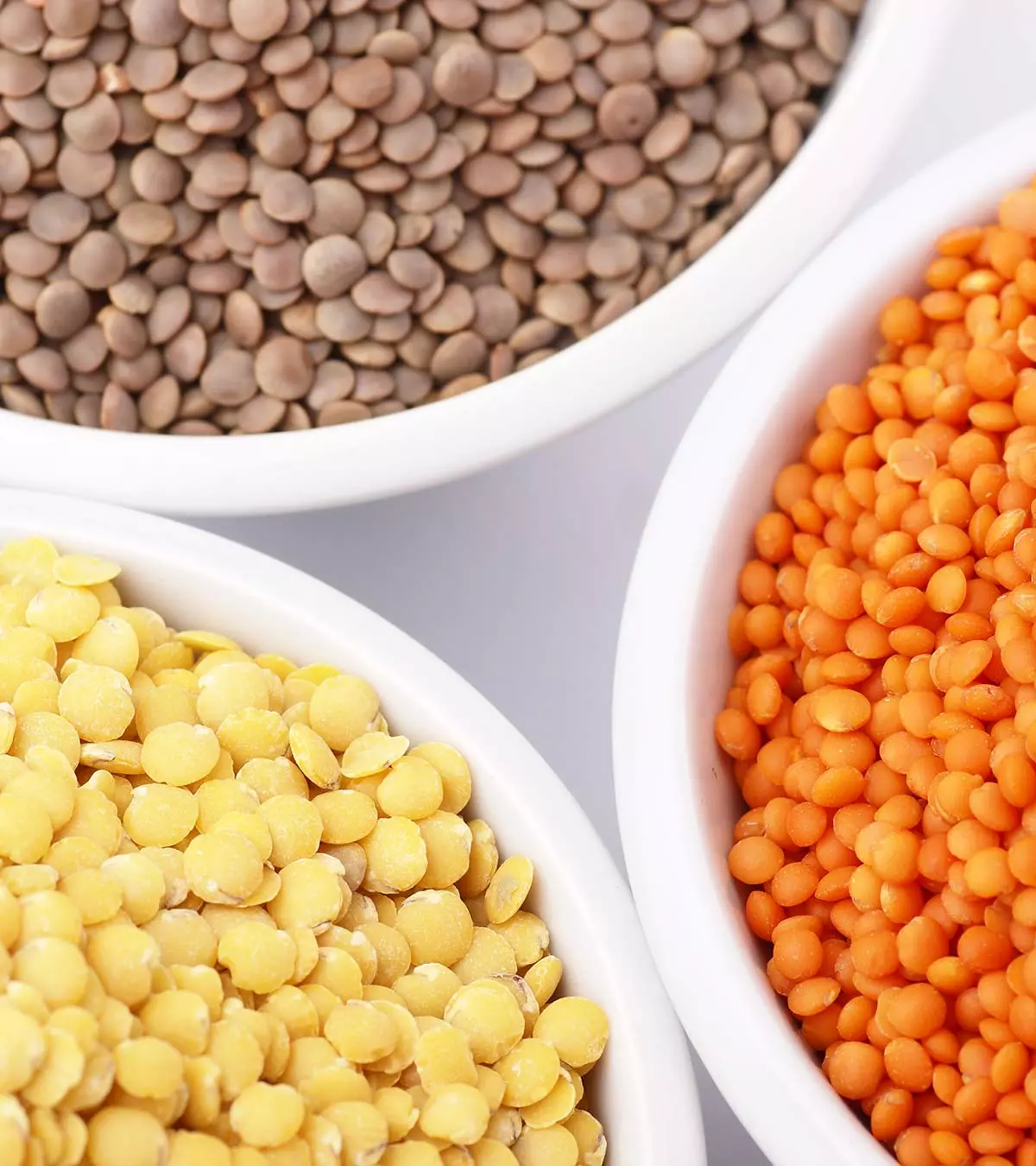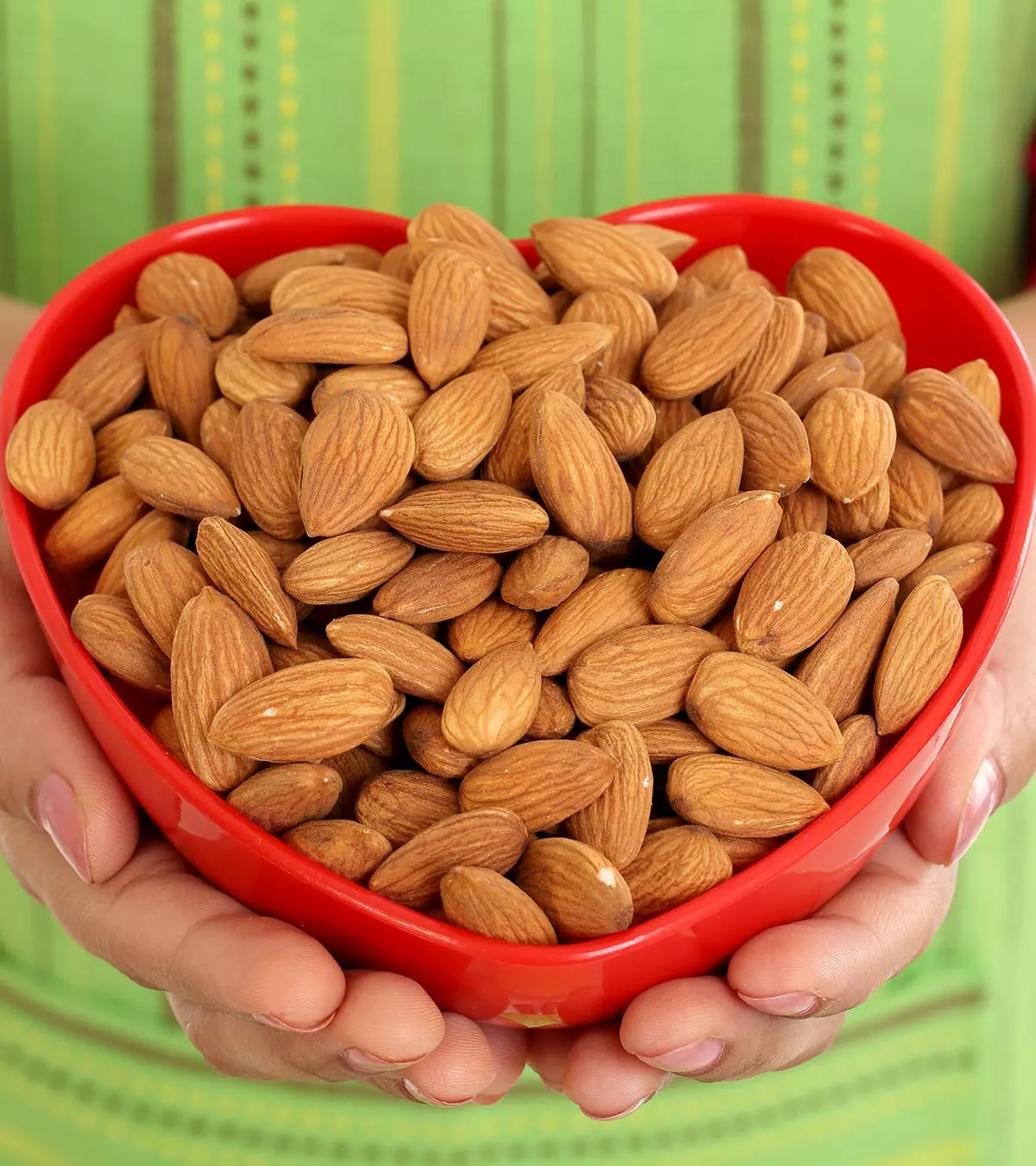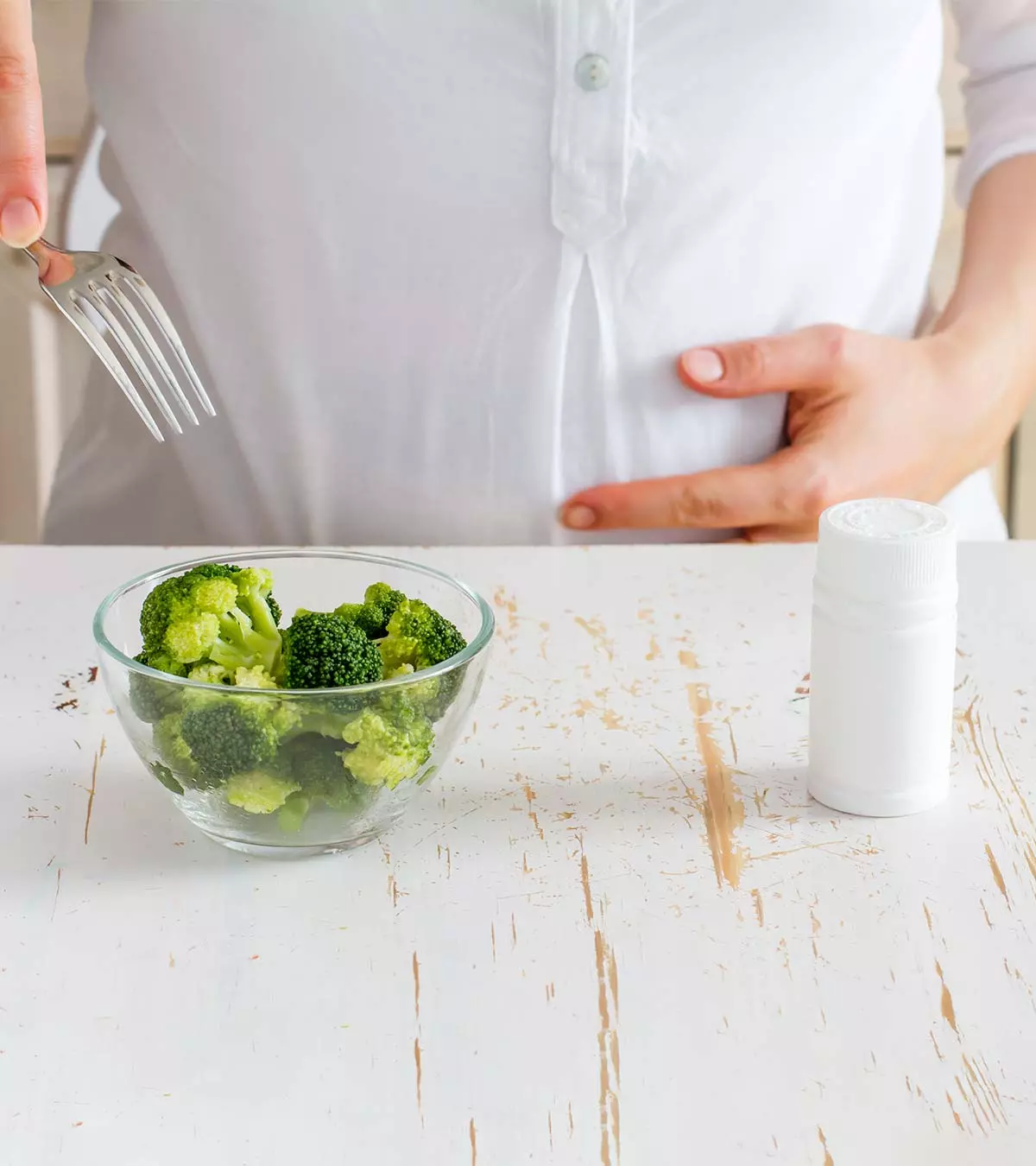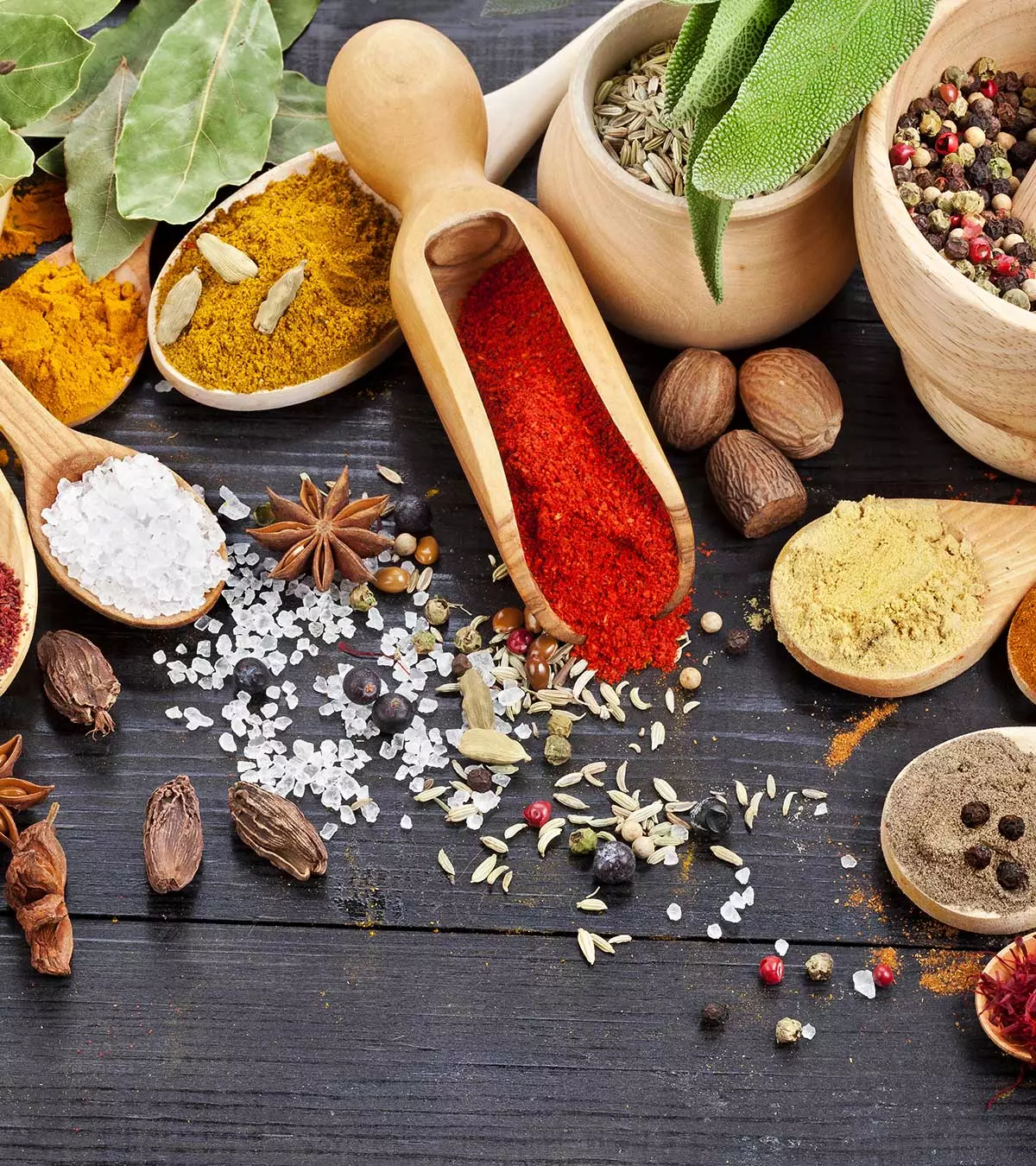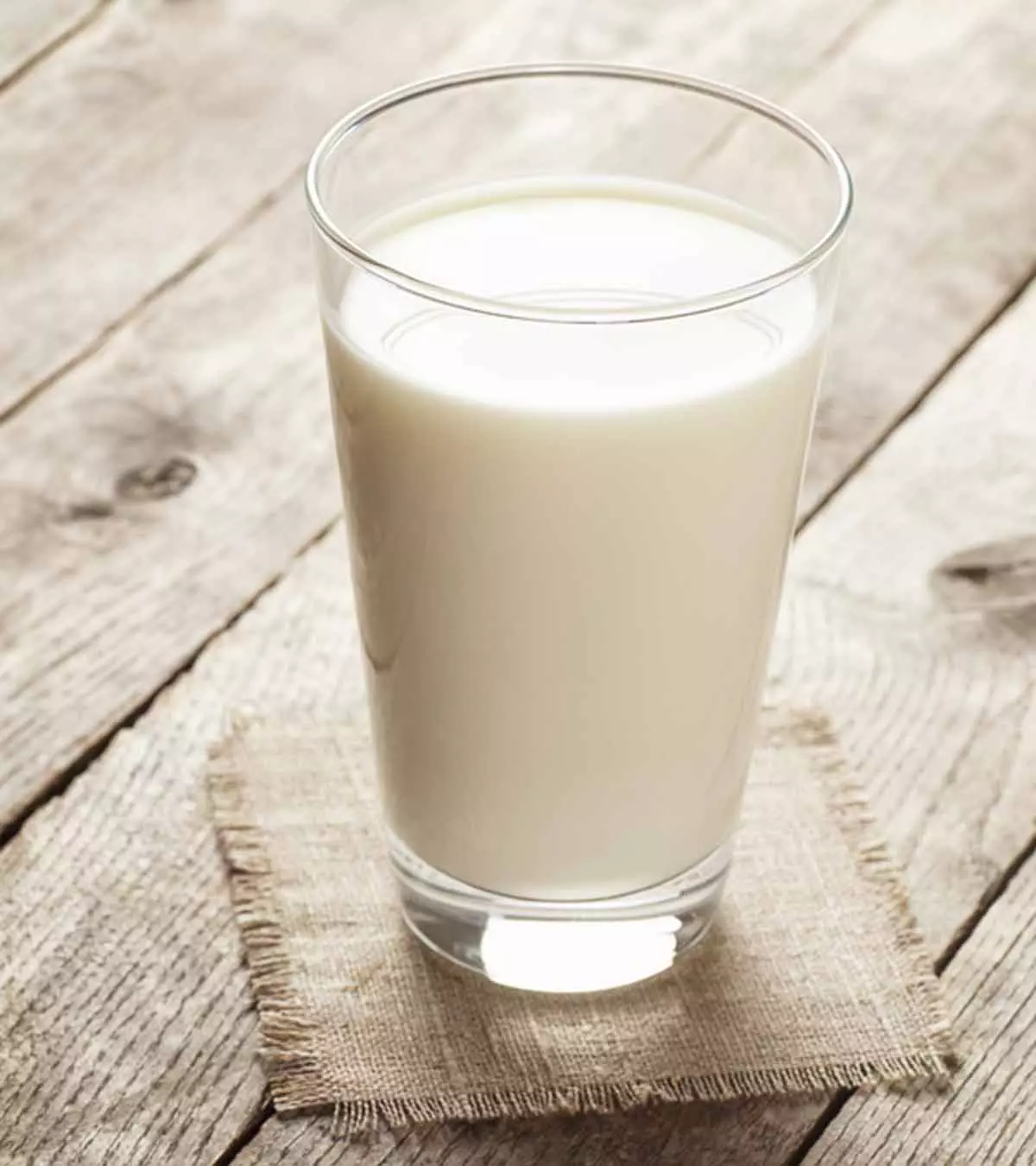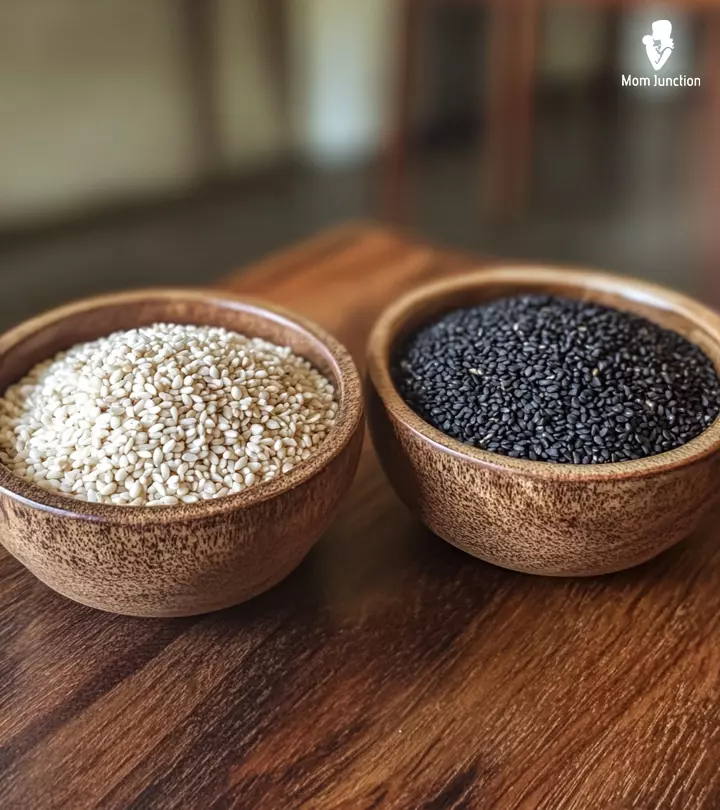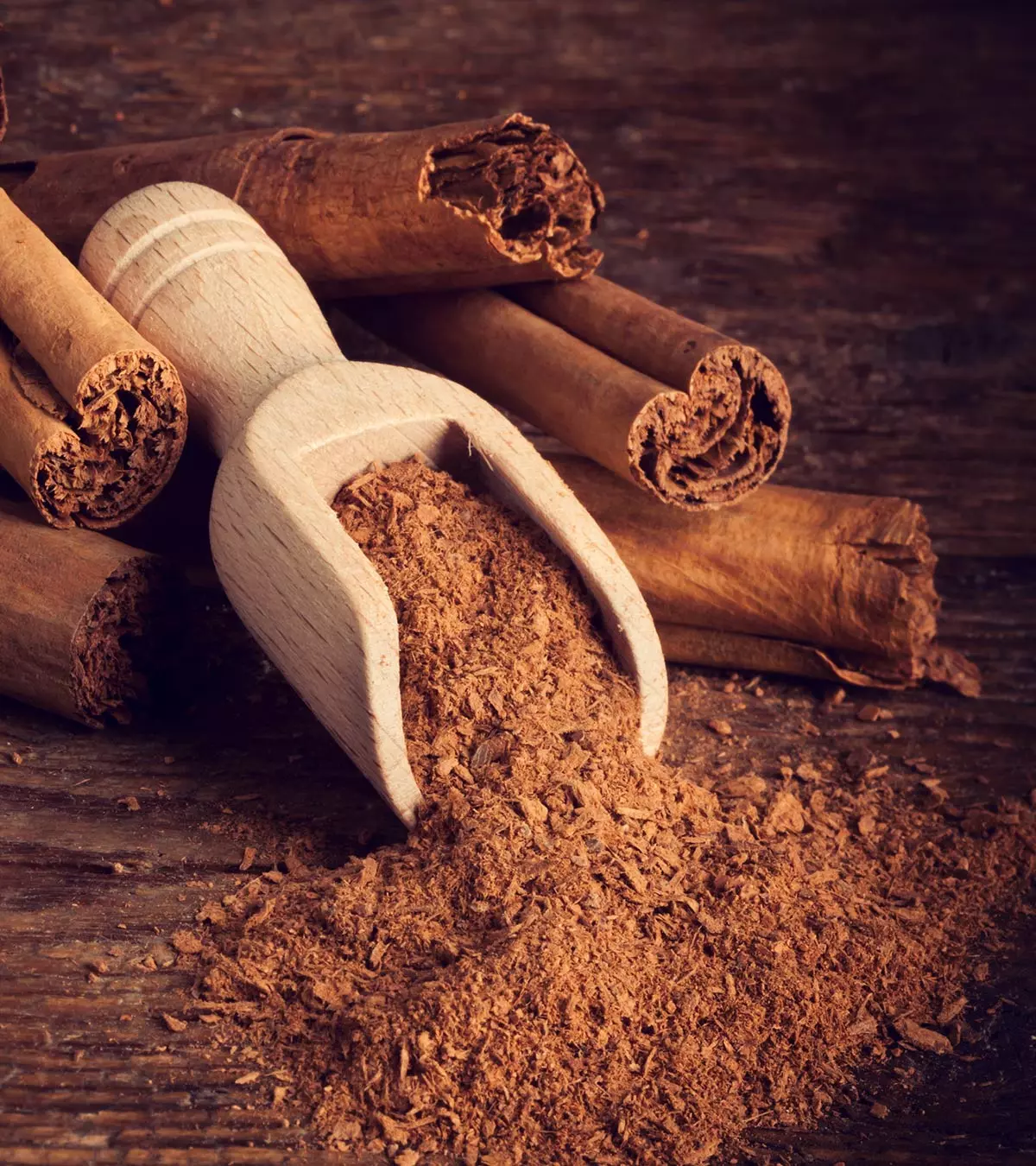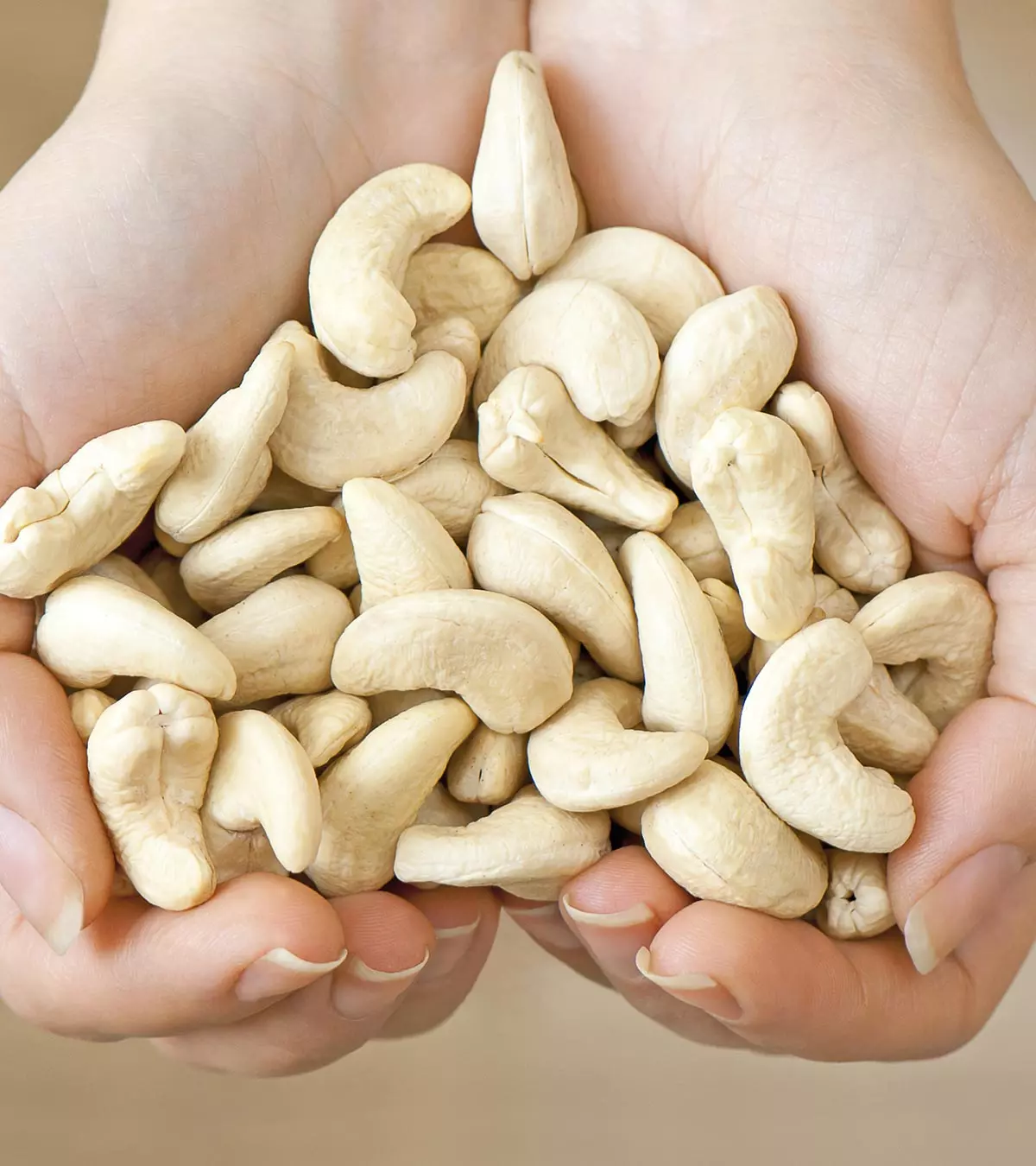
Image: Shutterstock
Nuts are an excellent source of vitamins and minerals. Many women may consider having cashews in pregnancy due to the nut’s rich micronutrient content. The type of food you eat during pregnancy can affect the fetus. Therefore, it is often better to consult a doctor before eating a new food item. So, should you consult a doctor before having cashew nuts in pregnancy?

Read this post to learn about the benefits and precautions for consuming cashews in pregnancy.
Key Pointers
- Zinc in cashew nuts can help in fetal growth and development.
- Folic acid in cashews helps prevent congenital disabilities, such as spina bifida.
- Fiber-rich cashews may also help prevent constipation.
Are Cashew Nuts Safe To Eat During Pregnancy?
Yes. Cashew nuts are safe to consume and make a great addition to the pregnancy diet, provided you are not allergic to them (1).
Cashews are a rich source of essential vitamins and minerals that help in the growth and development of your baby. To ensure better nutrition, consider choosing smaller-sized organic cashew nuts. These nuts are grown without pesticides, herbicides, or insecticides. They also retain their original taste. They also contain squaleneiCompounds in fish oil that possess antioxidant, anticancer, detoxifying, and hydrating qualities. , phytosterolsiNatural compounds in plants that can help reduce cholesterol levels. , tocopherolsiA form of vitamin E with significant antioxidant activity. which are beneficial during pregnancy.
During pregnancy, it is necessary to have the recommended amount of cashew nuts, neither too many nor too few.
How Many Cashews Should You Eat A Day During Pregnancy?
Cashew nuts are high in calories and fats. According to the Australian Dietary Guidelines, 30gm of various nuts can be consumed every day; it equals around 15 cashews (2, 3). However, it is always better to get an allergy test done before consuming cashews, to avoid any side effects.
The following section gives an overview of the nutritional value of cashew nuts.
Nutritional Content Of Cashew Nuts
The nutritional value of cashews per 100gm of serving is as mentioned below (4):
| Nutrients | Nutritional value |
|---|---|
| Magnesium | 292mg |
| Potassium | 660mg |
| Phosphorus | 593mg |
| Zinc | 5.78mg |
| Calcium | 37mg |
| Iron | 6.68mg |
| Folate | 25mcg |
| Vitamin K | 34.1mcg |
| Copper | 2.195mg |
| Carbohydrate | 30.19gm |
| Dietary fiber | 3.3gm |
| Protein | 18.22gm |
| Fat | 43.85gm |
| Saturated fat | 7.783gm |
The amount of calories you get when you consume cashew nuts depends on how you eat them.
- 1 tablespoon cashew nut butter (without salt) = 94 calories (5).
- 1oz unsalted cashews (raw) = 157 calories.
- 1oz unsalted cashew nuts (oil roasted) = 165 calories (6).
Including the recommended amount of cashew nuts in your daily diet gives you and your baby several nutritional benefits.
 Quick fact
Quick factWhat Are The Health Benefits Of Cashew Nuts During Pregnancy?
Here is how you can benefit from eating cashews during pregnancy:
- It contains zinc, an essential mineral for immune system function and rapid cell growth in the fetus (7).
- It contains significant amounts of calcium that could help strengthen the teeth and gums during pregnancy (8).

- Folic acid helps prevent birth defects like spina bifidaiA congenital disorder where the spinal cord doesn't fully develop, leading to physical and neurological complications. in babies.
- Cashew nuts are a good source of iron that helps promote red blood cell production and also fights fatigue and anemia.
- Consuming cashew nuts in pregnancy could help maintain the blood glucose level, especially in the case of gestational diabetes.
- It is rich in fiber and helps prevent constipation.
- Cashew nuts are mainly good for underweight (BMI below 18.5 before pregnancy) women who want to gain steady weight during pregnancy, as these nuts are rich in calories and fats (9).
- Consuming cashew nuts during pregnancy reduces the risk of allergies in the fetus (10).

- Loaded with magnesium, it prevents muscle cramps, headaches, and migraines (11) (12).
- Cashew nuts are a good source of vitamin K that promotes blood clotting in pregnant women. It is also essential to prevent the fetus from the risk of a bleeding disorder called vitamin K deficiency bleeding (VKDB) or hemorrhagic disease of the newborn (HDN) (13). These nuts are packed with potassium which helps maintain the blood pressure level by neutralizing the adverse effect of sodium (14).
- These nuts are a good source of protein that helps in amino acid production and cell repair during pregnancy.
 Health fact
Health factIf you like munching on cashews, and eat a bit too many, you may have to deal with certain risks as well.
Possible Side Effects Of Cashews During Pregnancy
Overeating of cashew nuts can lead to health problems such as:
1. Excess weight gain
Cashews, being rich in carbohydrates and fats, can lead to excess weight gain during pregnancy.
2. Allergy
Cashews in nuts contain traces of a component called urushiol (15) (an oily organic compound with allergic properties), which can cause itching and rashes on the skin. It is the reason that cashews are never sold in the shell.
3. Gallstone and kidney stone issues
Cashews contain oxalatesiA natural substance found in many foods, may be responsible for the formation of crystals in the urine. in a considerable amount (16), which gets absorbed in the body fluids causing gallbladder and kidney stone issues (17).
4. Cardiovascular problems

Cashews also contain some amount of saturated fats. If these nuts are consumed in excess, it can increase cholesterol levels, leading to cardiovascular problems (18).
5. Increase blood pressure
Overeating salted cashews can increase the sodium intake which worsens the blood pressure, and put pressure on the arteries, heart, and kidneys. It also increases the risk of preeclampsia.
If you are allergic to cashews or think you may be, it is best to stay away from them. Next, we tell you how to identify an allergic reaction to cashew nuts.
What Are The Symptoms Of Cashew Nut Allergy?
Here are some symptoms of allergic reactions triggered by cashew nut consumption (19):
- Abdominal cramps
- Nausea or vomiting
- Abdominal pain
- Trouble swallowing
- Itchiness in the eyes
- Diarrhea
- Itchiness in the throat or mouth or skin

- Nasal congestion/ runny nose
- Shortness of breath
- Anaphylaxis (it is a severe allergic reaction that puts the person in shock, but it is a rare condition) (20)
Here is a list of foods that might contain cashew and should be avoided if you are allergic:
- Mixed nuts
- Pesto sauce
- Snack mixes
- Cashew nut butter
- Sweets and candies
- Asian meals
- Ice cream
- Cakes
- Nut brittle
- Chocolates
Read below to know the ways to avoid any side effects of cashew nuts during pregnancy.
Precautions To Be Taken While Eating Cashew Nuts During Pregnancy
The following are some precautions you must take while consuming cashews:
- Consume plain cashews and not salted or seasoned ones. It can limit the intake of sodium during pregnancy.
- Do not take more than one ounce of cashew nuts in a day as it can worsen hypertension and cholesterol.
- Consult with your doctor before adding cashews to your diet to ensure that you incorporate these nuts according to your specific trimester requirements.
If you are allergic to tree nuts, avoid cashews entirely. Otherwise, include them in the diet for health benefits.
The following section gives you ideas on how to include cashew nuts in your daily pregnancy diet.
Ways To Add Cashew Nuts To Your Pregnancy Diet
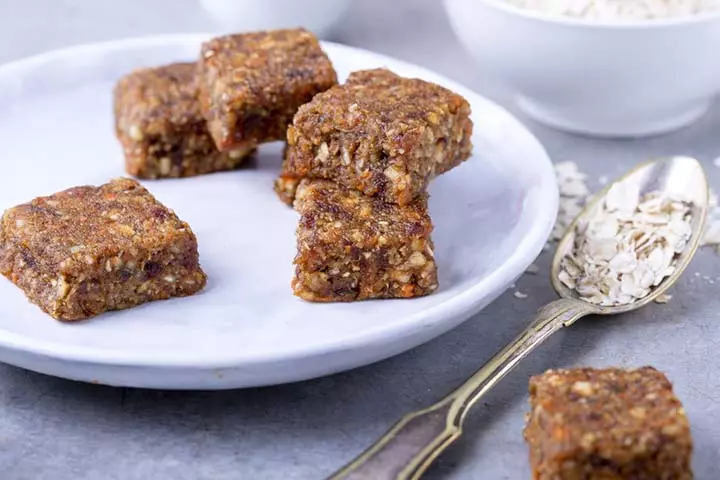
Here are some tips to include cashew nuts in your diet:
- Mix cashews with other dry fruits to make a healthy snack. Munching on dry fruits during pregnancy may help you maintain your energy levels throughout the day.
- Make cashew butter by blending the cashew nuts and enjoy it as a spread or dip for fruits.
- Add it in your breakfast cereal or stir-fried vegetables.
- Include it in the chocolate, cake, sweets, and other preparations.
- Add cashews to maple syrup and use it as a topping for the breakfast cereal.
- Make cashew yogurt by blending cashew nuts, cinnamon, and dates. You can top it with berries of your choice and maple syrup.
- Make carrot cashew paste by blending carrot, cashews, fresh ginger lemon juice, and soy sauce to get a smooth paste. Top it with cucumber slices.
- Add cashews to breakfast smoothies to increase their nutritional value.
 Quick tip
Quick tipFrequently Asked Questions
1. What happens if you eat raw cashew in pregnancy?
Raw cashews with shells contain urushiol, a toxic oil that can cause skin irritation and mouth blisters when ingested. However, most cashews sold in stores are steamed to remove the urushiol, making them safe for consumption. Expecting women can consume steamed or roasted cashews in moderation as part of a healthy and balanced diet (21).
2. Are cashews healthier than other nuts during pregnancy?
All nuts, including cashews, are a good source of essential nutrients, such as protein, fiber, essential minerals, and omega-3 fatty acids. These nutrients can significantly benefit maternal health and contribute to the overall well-being of both the mother and the baby (22).
3. Does cashew increase fetal weight?
Eating excess cashews during pregnancy may lead to an increase in maternal weight; however, there are no studies that suggest an increase in fetal weight. Instead, it can help promote healthy fetal development and well-being.
4. What do pregnancy cravings for cashew mean?
Hormonal and sensory changes may cause food cravings during pregnancy, but they do not necessarily indicate a deficiency or specific need. Instead, they may simply mean that a particular food is more appealing or comforting.
Cashew is a good source of nutrients such as zinc, calcium, folic acid, and iron, which help in the cell growth of the fetus, strengthen the tooth and gums of the mother, and fight anemia. Therefore, it is beneficial to consume moderate amounts of cashews in pregnancy. However, if you eat excess cashews, they may cause weight gain, kidney stones, or cardiovascular problems. Avoid eating them if you experience allergy symptoms like abdominal cramps, nausea, shortness of breath, etc. Consult your doctor if you experience discomfort.
Infographic: Ways To Manage Cashew Allergy During Pregnancy
Although cashews are a rich source of vital nutrients and a healthy food option during pregnancy, there might be certain instances when one develops an allergy to cashews. This infographic contains a list of tips that might help deal with the signs of the allergy. Read through it and save it for when you might need it the most.
Some thing wrong with infographic shortcode. please verify shortcode syntax
Illustration: Science-Backed Health Benefits Of Cashew Nuts In Pregnancy

Image: Dall·E/MomJunction Design Team
References
- Marília Ferreira Frazão Tavares de Melo et. al; (2017); Maternal intake of cashew nuts accelerates reflex maturation and facilitates memory in the offspring.
https://pubmed.ncbi.nlm.nih.gov/28663041/ - Pregnancy and diet.
https://www.betterhealth.vic.gov.au/health/healthyliving/pregnancy-and-diet - Nuts and seeds.
https://www.betterhealth.vic.gov.au/health/HealthyLiving/Nuts-and-seeds - Nuts, cashew nuts, raw; FDC ID: 170162.
https://fdc.nal.usda.gov/fdc-app.html#/food-details/170162/nutrients - Nuts, cashew butter, plain, without salt added, 1 tbsp.
https://www.urmc.rochester.edu/encyclopedia/content?contenttypeid=76&contentid=12088-1 - Nuts, with salt added, oil roasted, cashew nuts.
https://www.nutritionvalue.org/Nuts%2C_with_salt_added%2C_oil_roasted%2C_cashew_nuts_nutritional_value.html - Vitamins and supplements during pregnancy.
https://www.pregnancybirthbaby.org.au/vitamins-and-supplements-during-pregnancy - Ritesh D. Vyavahare et. al .; Health Benefit of a Handful of Cashew Nuts (Anacardium Occidentale L.) to Prevent Different Disorders Like Diabetes, Heart Disorders, Cancer, Weight Gain, Gallstone, Migraine Headache.
https://gsbb.goa.gov.in/wp-content/uploads/2025/09/Gazette-Notification-of-Plantation-Scheme.pdf - Pregnancy: Nutrition.
https://health.clevelandclinic.org/pregnancy-diet - Can Eating Nuts During Pregnancy Lower Your Child’s Risk Of Allergies?.
https://goldengateobgyn.org/can-eating-nuts-during-pregnancy-lower-your-childs-risk-of-allergies/ - Interventions for leg cramps during pregnancy.
https://www.cochrane.org/CD010655/PREG_interventions-leg-cramps-during-pregnancy - Supplements.
https://migrainetrust.org/live-with-migraine/healthcare/treatments/supplements/ - Vitamin K For Newborn Babies To Prevent Serious Bleeding.
https://www.kidshealth.org.nz/vitamin-k-for-newborn-babies-to-prevent-serious-bleeding - Potassium.
https://nutritionsource.hsph.harvard.edu/potassium/ - Urushiol.
https://www.sciencedirect.com/topics/nursing-and-health-professions/urushiol - Kidney Stones.
https://www.wakehealth.edu/condition/k/kidney-stones - Stefania Fagagnini et. al (2017); Risk factors for gallstones and kidney stones in a cohort of patients with inflammatory bowel diseases
https://www.ncbi.nlm.nih.gov/pmc/articles/PMC5638235/ - What is Cholesterol?
https://www.heart.org/en/health-topics/cholesterol/about-cholesterol#.WvvJAmR97_g - Tree Nut.
https://acaai.org/allergies/allergic-conditions/food/tree-nut/ - Anaphylaxis.
https://acaai.org/allergies/symptoms/anaphylaxis/ - Cashew nuts.
https://plantvillage.psu.edu/topics/cashew-nuts/infos - 5 Snack Foods to Eat While Pregnant.
https://www.hopkinsmedicine.org/health/wellness-and-prevention/5-snack-foods-to-eat-while-pregnant
Community Experiences
Join the conversation and become a part of our nurturing community! Share your stories, experiences, and insights to connect with fellow parents.
Read full bio of Dr. Shikha Sharma
Read full bio of shreeja pillai
Read full bio of Swati Patwal
Read full bio of Lorraine Teron






